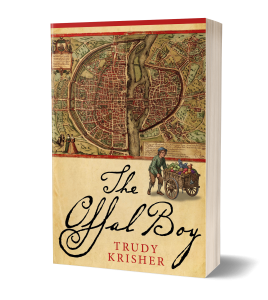I first began imagining the story of the ‘offal boy’ over ten years ago. In a sermon, Richard Venus, the minister to whom this book is dedicated, shared an apocryphal tale about a community of French Huguenots escaping persecution in 16th century France by sailing across the English Channel to safety in England.

Within sight of the coast, their boat sprung a leak and began to sink. What were they to do? Furiously bailing water, they had to lighten their human cargo. But how to decide who would remain on board and who would be tossed into the sea? Would they sacrifice the old? The infirm? The babies and children?
Their decision was brilliant. A group of young men, strong swimmers, dove into the ocean, and the less able members of the community threw each of them a rope. Holding tight to the rope, the swimmers managed to pull the boat to shore, saving the entire community without sacrificing a single member.
To me, the story was about the blessings of community, and, like most of my books, it began with a series of questions: What is the importance of community? How is community built? Who can become part of a community? What defines a community’s spirit? What should be sacrificed on behalf of a community? How should a community treat those outside the community?
I built a story to honor those questions. The result is The Offal Boy.
As in all of my novels, social justice is a compelling theme. I’ve written about racial justice (Spite Fences), economic justice (Kinship), educational opportunity (Uncommon Faith), and speaking truth to power (Fallout). In The Offal Boy the theme is religious tolerance, as relevant today as it was in the 16th century.
